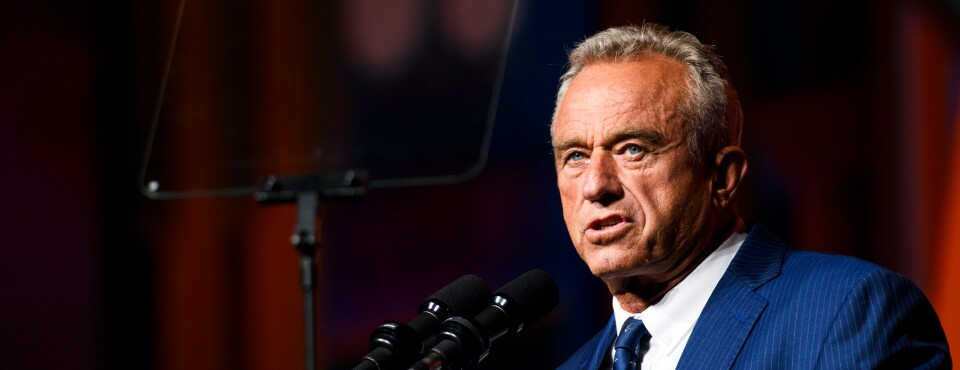Robert F. Kennedy Jr.’s nomination to run the Health and Human Services Department is being cheered by plaintiffs’ attorneys who focus on mass tort cases.
In Kennedy, they see one of their own. He’s a former trial attorney who handled large personal injury and environmental cases against corporate defendants. That history, and his roots in a Democratic dynasty, make Kennedy an unconventional pick for HHS chief in Donald Trump’s incoming administration.
“There’s more opportunities for plaintiffs’ lawyers and those involved in mass tort to be more bullish on the next four years,” said Steve Nober, founder and CEO of Consumer Attorney Marketing Group.
If confirmed by the Senate, Kennedy would take control of a massive bureaucracy that includes the Food and Drug Administration, the Centers for Disease Control and Prevention, and the Agency for Toxic Substances and Disease Registry.
Those agencies’ scrutiny of products is a potential guide for lawyers who sue companies accused of harming consumers. New regulations could also weaken some of the defenses that drugmakers in particular use to fight off mass tort suits.
Whether that happens remains to be seen, but Kennedy’s history of defending consumers, questioning the pharmaceutical industry, and calling for more stringent food regulation has mass tort lawyers cautiously optimistic.
“I have the unusual distinction of both being a plaintiffs’ lawyer and a proud member of the Republican party,” said Ashley Keller, a founding partner at law firm Keller Postman. “We welcome RFK to our club.”
A representative for Kennedy didn’t respond to a request for comment.
Going ‘Wild’
Nephew to president John F. Kennedy, RFK Jr. left the Democratic party to run for the White House as an independent. He endorsed Trump after dropping out of the race.
Trump said in a campaign rally before the election that he’d let Kennedy “go wild” on healthcare in a second administration.
Kennedy has been vocal about his distrust of vaccines, a view that his cousin and US Ambassador to Australia Caroline Kennedy described as “dangerous.” He’s also railed against food additives such as artificial dyes added to cereals like Kellogg’s Froot Loops.
As Secretary of Health and Human Services, Kennedy would oversee more than 80,000 federal employees. He would have the ability to directly influence regulations, according to current FDA Commissioner Robert M. Califf.
“The tradition in 99.95% of FDA decisions about individual products is that those decisions are made by career civil service,” said Califf during a recent interview at the Friends of Cancer Research annual meeting. “But it’s totally within the law for the president or the HHS Secretary to overrule the entire FDA.”
Kennedy began his career as a prosecutor in New York after graduating from law school at The University of Virginia. He later joined environmental advocacy group the Natural Resources Defense Council.
He was of counsel at injury law firm Morgan & Morgan, according to its website, and served as co-counsel with Wisner Baum in ongoing litigation over Gardasil, a vaccine for certain types of human papillomavirus.
At HHS, he would have the power to influence drug and medical device regulation, scrap a liability shield for pharmaceutical companies, or re-review the science behind products that are already on the market.
That would be welcome news for attorneys who believe the FDA is beholden to the companies it regulates and could create a path for litigation against different products.
Goodbye Revolving Door?
Kennedy could make a lasting impact by limiting companies’ influence over health regulators, mass tort lawyers said.
Keller frames the issue as “regulatory capture.” Some agencies have become dominated by the interests they regulate, instead of the public interest.
Mike Papantonio is a prominent injury lawyer who has tried pollution cases with Kennedy and his nonprofit environmental group Waterkeeper Alliance. The two also hosted “Ring of Fire,” a progressive radio show, for more than 15 years.
Papantonio is hopeful that Kennedy will close off the “revolving door” between FDA employees and companies the agency regulates, like Pfizer Inc. and Johnson & Johnson.
“It’s a culture of furthering the interest of people we’re supposed to protect. Those are the types of things that Bobby’s been talking about since I’ve known him,” Papantonio said. He could “do away” with “people who have been so complacent” about “the conduct of corporate America.”
Trump Question
Ross Wallin, co-founder and managing principal at mass tort ligation funder Curium Capital is wary.
“RFK may personally have some views that are more in line with some people in the plaintiffs’ bar,” Wallin said. “Obviously, there are other elements of Republican administrations that have traditionally been more hostile to the plaintiffs’ bar.”
“If you’re a plaintiffs’ lawyer, you probably look at it and say, ‘well, maybe there will be some positives and maybe there will be some negatives.’”
Trump is a “wild card” who makes it tough to predict how much power Kennedy ultimately will have to shape HHS, said plaintiffs’ attorney Majed Nachawati.
“The multibillion-dollar question is whether Trump’s going to allow that or not, given the extreme influence of big business lobbyists that are going to come in and are to be sure to counteract whatever they think would hurt their bottom line,” Nachawati said.
